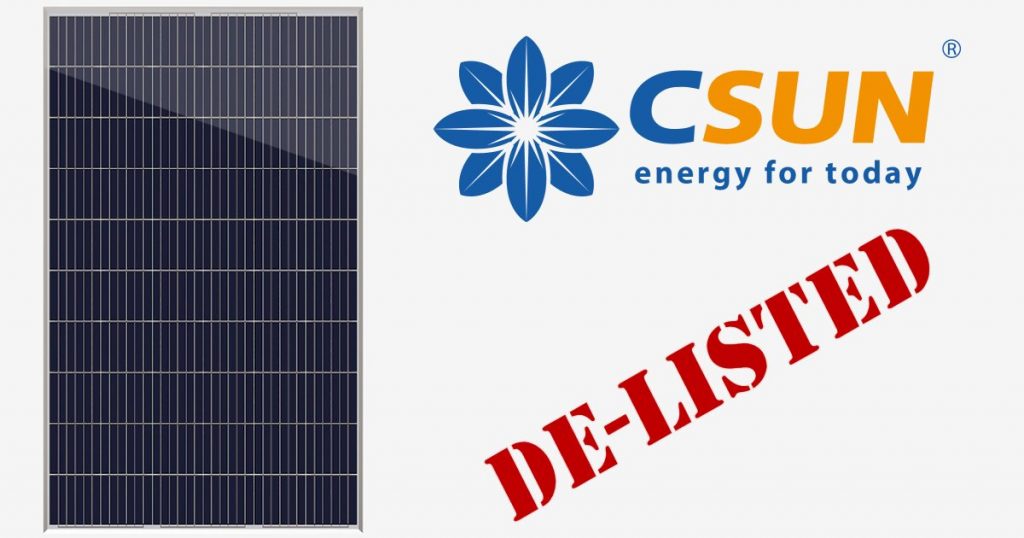
The Clean Energy Council has announced all China Sunergy (Nanjing) Co Ltd (CSUN) solar panels are no longer approved for installation under Australia’s Small-scale Renewable Energy Scheme (SRES).
In order to be eligible for Australia’s “solar rebate“, panels must be approved by the Clean Energy Council (CEC) and present on its approved modules list at the time of installation.
According to the CEC, CSUN panels fell afoul of conformance due to the use of cells and connectors outside the scope of the certificate; issues that became apparent in the CEC’s latest round of testing.
“The panels also used serial numbers that do not conform to formats supplied to the CEC and do not allow identification of the place of manufacture,” stated the CEC in a recent member update. “The connectors used differ from those advised on the datasheet, leading to potential safety issues with mismatched connectors at the time of installation.”
China Sunergy solar panels approved for use just prior to the CEC’s action were:
- CSUN270-60P
- CSUN275-60P
- CSUN265-60P
- CSUN330-72P
- CSUN300-60M
- CSUN305-60M
- CSUN325-72P
- CSUN335-72P
- CSUN340-72P
- CSUN340-72M
- CSUN345-72M
- CSUN350-72M
De-listing isn’t always a one-way trip to hell with no hope of redemption. Measures can be taken by a manufacturer in order to get back on the list. In China Sunergy’s case, this includes:
“Assessment and certification of the component, a special factory inspection and report by the certifier and other corrective actions are required before the modules can be re-listed by the CEC.”
China Sunergy Co., Ltd. was founded in 2004 and is headquartered in Nanjing, China. The company has 7 production facilities worldwide and produces standard poly, mono, half-cell and bifacial modules. You can read more about CSUN solar panels and China Sunergy here.
Not All De-Listings Are Equal
A solar panel that is no longer on the Clean Energy Council’s approved list isn’t necessarily problematic in operation, nor will it suddenly stop working through being struck off. There are also other reasons a module may be de-listed that have nothing to do with non-conformance. For example, in some instances a manufacturer may have decided to no longer supply a certain module model into Australia.
Where a de-listing has occurred, the reason (if available) should be noted and if you have concerns, contact your installer for further details.
If a product has been de-listed due to a potentially severe operational safety issue, a recall action may be subsequently initiated; details of which can be found on Product Safety Australia. Issues with solar panels and inverters requiring a recall action in Australia have been rare.
Currently the CEC’s approved modules list includes 3,150 products from 77 manufacturers. The approved solar inverter list, which currently has 1,296 products from 99 manufacturers, can be found here. It’s wise to check the lists just prior to your installation occurring to ensure the panels/inverter are still present.
If you’re in the market for solar power and not sure which brands to consider, check out SolarQuotes’ trusted brands charts.

 RSS - Posts
RSS - Posts



How much for batteries in au dollars please ?
Hi Adrian
Our battery comparison table gives prices in Australian dollars:
https://www.solarquotes.com.au/battery-storage/comparison-table/
Note this is without installation cost and often does not include other equipment such as a hybrid inverter that may be required. Even for a battery such as the Tesla Powerwall 2 which doesn’t require a hybrid inverter, after installation costs including commonly required switchboard alternations, the total cost might be $16,000. (This is before any subsidies that may be available at your location.)
Hi I have had 5 quotes for solar roof panels. All are around $9-11K which I guess is reasonable. However the last guy from Energy Buster told us that the following brands from China will not be allowed to import from China, the ban will come into effect come the new year. I cant find anything on line that specifically mentions Australia banning the following:
Jinko – Trina – Longi – JA Solar – Canadian Solar
Can you throw any light on the veracity of this please? One of our quotes includes the Jinko brand. I am concerned should these panels be used, somewhere down the road, they will be irreplaceable should one be faulty.
Thank you for your help.
[email protected]